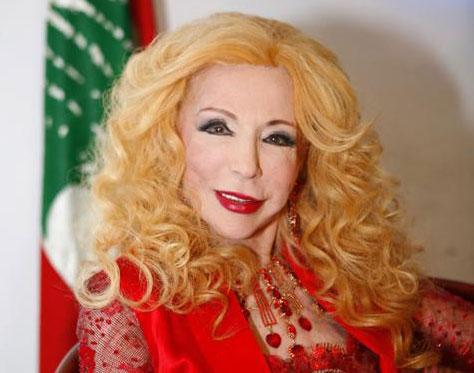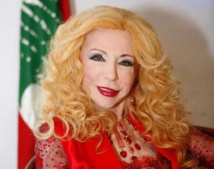Her death was major news in Lebanon, where Sabah is beloved as both a singer and a movie star who was never afraid to challenge social convention.
Born Jeanette Gergi Feghali on November 10, 1927, she later took the screen name Sabah (Morning in Arabic) but was affectionately known by the diminutive Sabbuha, or the nickname Shahrura (songbird).
She began performing in the 1940s, earning a reputation for her renditions of patriotic songs as well as folkloric ballads, though it was her light-hearted style that endeared her to fans.
She was also an icon of the big screen, launching her career in Egypt, the centre of the Arab film industry, and appearing in more than 90 movies, including her first "The Heart Has One".
She starred alongside many Egyptian heart throbs, including Rushdi Abaza, one of several men she would marry.
Sabah, who also performed on the stage and on television, will be remembered almost as much for a tumultuous love life that at times threatened to overshadow her reputation as a performer.
- Multiple marriages -
She is believed to have tied the knot at least nine times, though the precise figure has been disputed, ensuring that her private life was perpetually in the headlines.
Her first marriage, in 1946, was to Najib Shammas, who fathered her son, Sabah. Her daughter Huwaida was born from her union with Egyptian violinist Anwar Mansy.
Her other husbands included Egyptian television presenter Ahmad Faraj and Lebanese member of parliament Yusef Hammoud.
Her marriage to Abaza lasted just days, but the longest of her unions, clocking in at 17 years, was to Lebanese artist Fadi Lebnan.
She continued to shock fans with her dalliances well into her later years, getting engaged briefly in 2003 to a Mr. Lebanon winner several decades her junior.
In interviews, Sabah bluntly acknowledged she was unfaithful to most of her husbands, who she claimed were cheating on her.
She also feared that many of her husbands tried to take advantage of her fame and wealth. She was so generous with loved ones that those close to her nicknamed her "Madame Bank".
Sabah clung to the glamorous style of her youth well into her 80s, continuing to wear her hair long and blonde and undergoing multiple plastic surgeries.
Her longevity and bid for youth became the subject of lighthearted jest among the Lebanese, though in interviews Sabah said she found such comments offensive.
Her fame also extended far beyond the borders of Lebanon, and she performed at grand international venues including the Sydney Opera House and the Albert Hall in Britain.
She held Egyptian, Jordanian and US citizenship as well as Lebanese, and was close to several Arab leaders, counting the family of Jordan's late King Hussein as friends.
Lebanon's Information Minister Ramzi Jreij promised Wednesday that Sabah's funeral, set for Sunday in central Beirut, would befit her status as a national icon.
Large crowds are expected to pay their respects during several days of mourning before the singer is buried in her home village of Bdadun outside Beirut.
Tributes for the diva poured in from artists and politicians alike.
"With her passing away an entire beautiful past of Lebanon passes away," Lebanese politician Walid Jumblatt wrote on Twitter.
"She was a great singer of a Lebanon that my generation knew, that will never come back."
Several Lebanese pop stars changed their Twitter profile pictures to feature photos of the young Sabah, including starlet Haifa Wehbe.
"God bless you, our Sabuha. God willing you are in a more beautiful place," Wehbe tweeted.
Lebanese pop star Nancy Ajram said Lebanon "has lost a legend."
"Sabah has gone, but she lives on in our hearts."
------------------------------------------------------------------------------------------------------------
Born Jeanette Gergi Feghali on November 10, 1927, she later took the screen name Sabah (Morning in Arabic) but was affectionately known by the diminutive Sabbuha, or the nickname Shahrura (songbird).
She began performing in the 1940s, earning a reputation for her renditions of patriotic songs as well as folkloric ballads, though it was her light-hearted style that endeared her to fans.
She was also an icon of the big screen, launching her career in Egypt, the centre of the Arab film industry, and appearing in more than 90 movies, including her first "The Heart Has One".
She starred alongside many Egyptian heart throbs, including Rushdi Abaza, one of several men she would marry.
Sabah, who also performed on the stage and on television, will be remembered almost as much for a tumultuous love life that at times threatened to overshadow her reputation as a performer.
- Multiple marriages -
She is believed to have tied the knot at least nine times, though the precise figure has been disputed, ensuring that her private life was perpetually in the headlines.
Her first marriage, in 1946, was to Najib Shammas, who fathered her son, Sabah. Her daughter Huwaida was born from her union with Egyptian violinist Anwar Mansy.
Her other husbands included Egyptian television presenter Ahmad Faraj and Lebanese member of parliament Yusef Hammoud.
Her marriage to Abaza lasted just days, but the longest of her unions, clocking in at 17 years, was to Lebanese artist Fadi Lebnan.
She continued to shock fans with her dalliances well into her later years, getting engaged briefly in 2003 to a Mr. Lebanon winner several decades her junior.
In interviews, Sabah bluntly acknowledged she was unfaithful to most of her husbands, who she claimed were cheating on her.
She also feared that many of her husbands tried to take advantage of her fame and wealth. She was so generous with loved ones that those close to her nicknamed her "Madame Bank".
Sabah clung to the glamorous style of her youth well into her 80s, continuing to wear her hair long and blonde and undergoing multiple plastic surgeries.
Her longevity and bid for youth became the subject of lighthearted jest among the Lebanese, though in interviews Sabah said she found such comments offensive.
Her fame also extended far beyond the borders of Lebanon, and she performed at grand international venues including the Sydney Opera House and the Albert Hall in Britain.
She held Egyptian, Jordanian and US citizenship as well as Lebanese, and was close to several Arab leaders, counting the family of Jordan's late King Hussein as friends.
Lebanon's Information Minister Ramzi Jreij promised Wednesday that Sabah's funeral, set for Sunday in central Beirut, would befit her status as a national icon.
Large crowds are expected to pay their respects during several days of mourning before the singer is buried in her home village of Bdadun outside Beirut.
Tributes for the diva poured in from artists and politicians alike.
"With her passing away an entire beautiful past of Lebanon passes away," Lebanese politician Walid Jumblatt wrote on Twitter.
"She was a great singer of a Lebanon that my generation knew, that will never come back."
Several Lebanese pop stars changed their Twitter profile pictures to feature photos of the young Sabah, including starlet Haifa Wehbe.
"God bless you, our Sabuha. God willing you are in a more beautiful place," Wehbe tweeted.
Lebanese pop star Nancy Ajram said Lebanon "has lost a legend."
"Sabah has gone, but she lives on in our hearts."
------------------------------------------------------------------------------------------------------------









 Home
Home Politics
Politics











